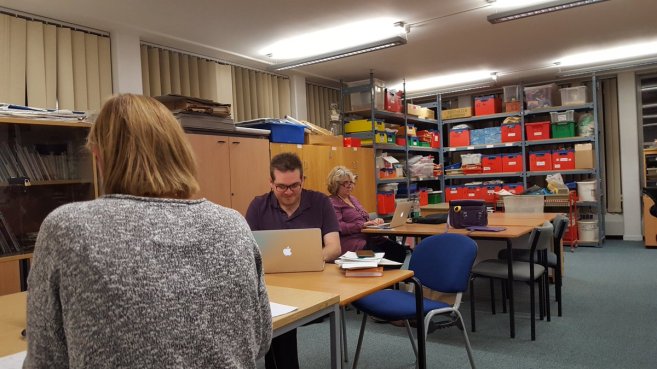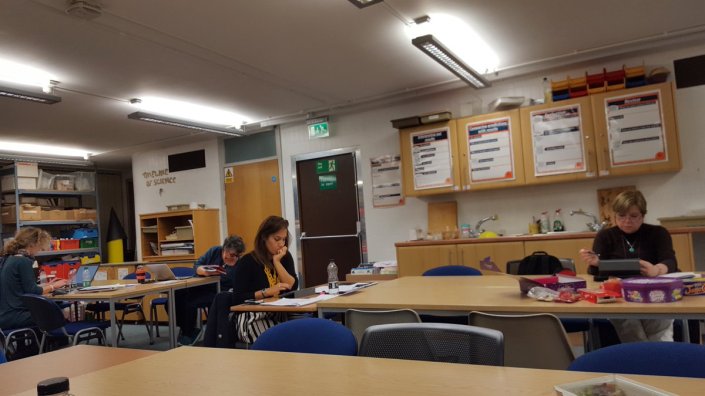Blogs
Writing your way to success

(This is a picture Lee – looking sceptical – with Jacqui and a shy Kathryn)
November 18, 2016 Lee Fallin EdD, Space
reblogged with assumed permission from here: http://leefallin.co.uk/2016/11/writing-your-way-to-success/
Today I took part in my first writing retreat, organised by @azumahcarol as part of the University of Hull, Doctor of Education (EdD) programme. I have to admit that while I had read some literature on support of this process (Murray & Newton, 2009; Moore, 2003; Petia & Annika, 2012), I was sceptical about it in this context. Sitting down from 9am to 5pm and focusing on writing alone sounds like a great idea – but I had two main concerns:
- The third year EdD students had not seen each other for weeks. In the case of our three Netherlands-based peers this was MONTHS. Surely after so much time apart we had too much catching-up to do to sit in silence?
- We are all at the very start of our thesis stage and sitting and writing for a whole day seemed like a big commitment and something we may not be ready for. (Okay – I admit, moving house has seriously destroyed my reading time!)
Despite my concerns, I hit the ground running this morning. I was determined to make the most of this opportunity. It isn’t often that I get such a large block of time to work on EdD coupled with the guarantee of no distractions. I had to make the most of opportunity as it was costing a day of annual leave. If I was going to waste the time, I’m sure I could have found something more fun to do.
For the first session I was able to write over 1,200 words in the 90 minute block. In honesty, most of this was achieved in the first 60 minutes as my concertation seemed to stagger towards the end of the block. I had a similar record for my second session 90 minute session, taking my total to around 2600 words. I have to admit I was proud of myself. 2600 fairly decent words in 3 hours. Just some tidying and referencing to go.
We concluded the morning at 13:00 and set off for an hour break. I was certainly hungry by this point and needed the break. I have to admit I had some concerns about the afternoon as my head was rapidly running out of things to write about. My lack of reading was finally coming to bite me.
Strategically, I spend the third session in the afternoon looking at something different. I was recently rejected from a journal and had to respond to some comments. This wasn’t my best idea as after the first 40 minutes I was thoroughly depressed and it soured the rest of the session.
That brings me to the last hour. It gave me the opportunity to Mindmap some new ideas, add another 300 words to my total and then write this.
All in all, I’ve written 3460 words today (including this blog post) and I’m pretty happy with that 🙂
Yes – I’m completely sold on structured writing days and I look forward to the next similar opportunity. We also did pretty well at resisting the temptation to write so clearly we’re all very dedicated! The power of finding ‘space’ to work.

References:
Moore, S. (2003) Writers’ retreats for academics: exploring and increasing the motivation to write. Journal of Further and Higher Education, 27(3), 333-342.
Murray, R. & Newton, M. (2009) Writing retreat as structured intervention: margin or mainstream? Higher Education Research & Development, 28(5), 541-553.
Petia, P. & Annika, C. (2012) Using structured writing retreats to support novice researchers. International Journal for Researcher Development, 3(1), 79-88.
A kitten in the garden! My 1st Doctoral Symposium
This post has been re-blogged from:
https://marycryan2013.wordpress.com/2015/06/06/a-kitten-in-the-garden-my-1st-doctoral-symposium/
Having had a very stimulating three days attending University of Hull’s Doctoral Symposium “Operationalising Postgraduate Research:real journeys, real voices,digital worlds” #DSHull I slept late this morning.
Sitting at the kitchen window eating a leisurely breakfast I saw a cat walking down the garden path, behind her were 5 very small, and very cute, kittens. It was obviously their first trip into the outside world, from, what we later discovered ,was their nest under our shed . They looked too small and too fragile to be out at all, but they were having a wonderful time, playing and falling over each other, each taking care of the next and the mother protecting them all.
That was most of the rest of the day gone, kittens being irresistible.
I’m sure you are wondering what this has to do with a Doctoral Symposium?
I’ve been reflecting on the experiences I have had over…
View original post 718 more words
These are a few of my favourite …. blogs

You may use blogs to explore all sorts of idiosyncratic interests such as raindrops on roses, or whiskers on kittens if you wish. This is a legitimate use. In this post I want to offer a few of my favourite blogs that I think might be of use for Doctoral researchers. I have tried to keep this as broad as possible – given that we all come from dramatically different educational contexts.
As well as providing conversational scholarship, a blog post is a perpetually open text, we can add, delete or change the history of the blog at will. With the blog time is always being re-written. If I note other useful blogs that I think colleagues may like, I shall edit them in … or write a new post.
So – for starters – these are my favourite blogs that I think you might enjoy:
https://patthomson.wordpress.com/author/patthomson/
This blog offers advice and guidance about academic writing. Anything from writing field notes, to writing on a day-to-day basis for your Doctoral Research. I quite like reading about the big themes of academic writing as well as the mundane details of academic practice. Pat’s blog gets the balance right in my view – between autobiography and analysis. Lots of really useful advice.
http://sociologicalimagination.org/archives/author/markcarriganauthor
Mark’s blog might not be for everyone. But, although he has only just completed his PhD he has a very well established reputation in how academics can use social media. He is also a sociologist. This is my disciplinary home so I admit to being biased. He’s not for everyone and writes very little about education. But for everything else social theory – this is the go to blog for inspiration. He also offers an excellent account of academic blogging.
Eddie is the principal of a 6th form college, I include his blog as an example of an established professional with an institutional reputation to defend. The blog offers more the PR and represents his broad view on the world. In this post, he is politely political without compromise to either is personal or professional integrity.
Andrew blogs about his research. He’s a prolific writer whose focus is on good governance in schools. This is his official blog that traces the unfolding of his ERSC funded research project School Accountability and Stakeholder Education (SASE) from its inception in 2012 to its conclusion on February 2015. He’s not a light read but for the school based researchers, he’s very interesting. This is a great example of blogging while researching.
